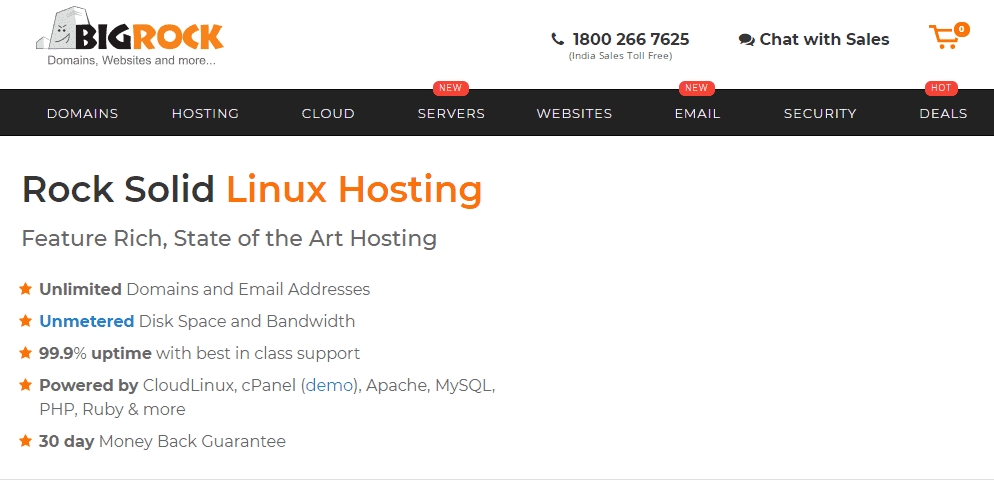
Choosing the right web hosting platform is central for any business aiming for a strong online presence. With countless web hosting services available, finding a provider that suits your website’s needs and budget requires careful planning. Reliable professional web hosting ensures visitors always find your site online and helps your business establish credibility.
Read more: Difference Between Domain Name and Web Hosting
What is Web Hosting?
Web hosting refers to a service that allows a website or web application to be accessible on the internet by storing its data on a web server. When someone types in your domain, your site’s files are delivered to them from the web hosting provider. Without a reputable web hosting company to manage this, your website won’t be available and will be unreliable.
What are the different types of web hosting services available?
Shared hosting, Cloud hosting, VPS hosting, Managed WordPress hosting, Reseller hosting, and Dedicated hosting are a few web hosting services offered by top hosting providers in India. Picking the best web hosting services for your website is important to improve its performance and functionality. The right hosting ensures you can easily access varied features that are required to run your website. All website data is stored on a specific server and accessed through a host. It can include different elements like text, videos, and images. Since all sites are different with varying needs, you need to know about types of web hosting to choose the right one.
1. Shared Hosting

Perfect for start-ups and small companies, Shared hosting is an entry-level hosting solution. This hosting lets you share resources with other websites on a single server. By splitting the resources, the cost reduces. You can choose Shared hosting servers from the different plans available. It is a viable option for saving money and a good choice for a website with not more than 10,000 visitors.
Advantages of Shared Hosting
- It is a cost-effective hosting solution for small business websites.
- The set-up is easy, and once you choose a plan - your site will go live in no time.
- You don't need any technical expertise to buy a Shared hosting plan.
Disadvantages of Shared Hosting
- Resources need to be shared with other websites, which may affect the website speed.
- For any performance issue, you need to contact the customer support team.
- Shared hosting has slow loading time and uptime, which can pose a problem.
- You won't be able to scale the website without added resources.
Further reading: Difference Between Shared Hosting and Dedicated Hosting
2. Virtual Private Server

One step above Shared hosting, Virtual Private Server is a single physical server, ideal for medium-sized businesses that can’t afford downtime. When a website outgrows a Shared hosting plan, the website owners shift to Virtual Private Servers. Your website will share a server with other sites, but the number of websites is low, and you get dedicated resources.
In a Virtual Private Server, the server is split into multiple virtual servers, and a website can customise it according to their need. VPS hosting ensures that a higher influx of traffic does not affect your website functions.
For custom configurations to the server – you can get optional root access with VPS. It allocates a separate RAM and CPU for a website. Websites with large files like – videos and images – should consider VPS.
Buy VPS web hosting now with these BigRock hosting coupons.
Advantages of Virtual Private Server
- It guarantees a higher uptime and faster loading website speed.
- It is more cost-effective compared to Dedicated Server hosting.
- VPS offers dedicated server resources and helps you make customized configurations based on your website needs.
Disadvantages of Virtual Private Server
- You'll need to share the server with other sites, which is a drawback.
- It is not easy to set up and need technical expertise.
- It has limitations in terms of what you can control on the website.
Further reading: Cloud Hosting vs VPS Hosting
3. Dedicated Web Server

A Dedicated Server is a hosting solution that comes with its own server. It offers complete flexibility and reliability but at a higher cost. It offers exceptional performance for high traffic and E-com websites.
It lets you handle up to thirty times an increase in traffic. Websites hosted on a Dedicated Server have complete control over the server settings. It helps choose configurations, software, and settings.
With Dedicated Server Hosting, you can expect faster loading speed and a higher uptime guarantee. It offers one physical server that lets you take full root access to a website.
Most hosting companies control client websites through a Dedicated Server. Dedicated Server hosting is ideal for Enterprise-level websites - that means more than 10,000 monthly visits.
You can purchase dedicated web hosting at a discount with these BigRock coupons.
Advantages of Dedicated Web Server
- It does not share resources with other websites. You can expect complete control.
- It offers higher security features compared to other hosting plans.
- With a faster loading time, your website won't have loading issues.
- Expect optimal performance with Dedicated server hosting.
Disadvantages of Dedicated Web Server
- It is expensive and not suitable for all websites.
- You require technical expertise to understand the basic setup process.
- It gives you complete control, so there are issues if you are not fully knowledgeable about servers.
Further reading: Web Server and Its Different Types
4. Cloud Hosting

A hybrid version of VPS hosting, Cloud hosting is the most preferred choice for websites today. It comes with multiple remote servers, and each server can scale. If one server is down, the other will take responsibility for the network and pick the slack.
Cloud hosting provides the best uptime rate and optimal performance. The hosting solution offers scalability and immediacy. You will be able to determine the resources and space you need in real-time. It lets you access servers and use them depending on your website needs. It accommodates the spikes in website traffic, so your site will not suffer.
Cloud hosting is the best solution for medium and larger websites. If your website expects more than 50,00,00 monthly visits, consider a Cloud Hosting plan.
Read this BigRock review to learn about the Cloud hosting services offered by BigRock.
Advantages of Cloud Hosting
- Cloud hosting offers higher security on plans.
- You can scale added resources on demand if there is an increase in site traffic.
- The downtime is less, so your website is accessible to users all the time.
Disadvantages of Cloud Hosting
- The price of Cloud hosting plans is not fixed - it works on a pay-as-you-use model.
- If the traffic is more, it may increase the cost.
- It offers limited customised features.
Further reading: Cloud vs Shared Hosting
5. Reseller Hosting

Reseller Hosting is a kind of shared hosting, but the user gets complete control over the server. Most people opt for Reseller hosting as a part of an extra earning opportunity. It shares resources and available bandwidth with other sites on behalf of the service provider.
Reseller hosting offers complete flexibility compared to Shared hosting. It helps people to create and maintain smaller websites. Based on your Reseller hosting plan, you will be able to choose ten to 200 different cPanel accounts. It helps developers and designers offer better hosting solutions to clients.
Advantages of Reseller Hosting
- Reseller Hosting plans are cost-effective.
- You don't have to worry about the technical expertise of running the website.
- It lets you create your web service plans for clients and earn extra income.
- It lets you build your own hosting brand in the web space.
Disadvantages of Reseller Hosting
- The success depends on the host and features it offers.
- If you're migrating, it may affect your business or clients.
- For the Reseller business, you will have to deal with different customers and their requirements.
Further reading: Reseller hosting vs VPS hosting
6. Managed Hosting

Managed web hosting refers to the process where all of the technical aspects of the website (updates, backups, security, etc.) are taken care of by the web hosting company. This IT professional-hosted web service is perfect for business owners who prefer a more hands-off approach so they can rely on best practices for performance optimisation and troubleshooting from the experts. Scale, regular monitoring of the website, and priority support are key benefits of managed hosting so that businesses can focus on growth and better customer experiences.
Advantages of Managed Web Hosting
- It saves time, as the web hosting provider handles updates, backups, and technical tasks; owners can focus on business.
- It has more security, as managed services include firewalls, antivirus, and monitoring from a professional hosting company to safeguard your website.
- It offers performance and network stability by way of expert management and capacity from their robust infrastructure.
- It entails access to customer support any time, day or night, for troubleshooting and technical issues.
- Scalability, since the hosting platform increases resources when needed without upgrades.
Disadvantages of Managed Web Hosting
- Managed web hosting can be more expensive than unmanaged hosting because you are not just paying for the server but also for the management services, as well as possibly premium features (e.g., SSL certificates, custom backups, etc.).
- As you are paying a third party to handle server management, you will have less control over server settings and configurations, and you run the risk of vendor lock-in, as it can be difficult to switch hosting providers after you have integrated all of your services.
- Custom software or plugins may be restricted by some providers, which can limit your ability to install them on your server.
- Some providers may also charge additional fees for exceeding resource limits or for needing more server space.
Further reading: Shared vs WordPress Hosting
7. WordPress Hosting

WordPress web hosting is specialised for WordPress sites and includes platform-specific optimisation, automatic updates, and security features. A dedicated web hosting provider often pre-installs WordPress and provides customer support tailored for WordPress queries. It’s ideal for bloggers, creators, and small businesses who need an easy, reliable way to manage and grow their WordPress sites with dedicated support.
Advantages of WordPress Web Hosting
- Optimised for WordPress, which means faster speeds and greater performance using cutting-edge hardware and software.
- More security, as your hosting company regularly implements updates and safeguards relating to WordPress security issues.
- More hands-off management through automated backups and updates from a reputed hosting provider.
- Specialist WordPress support for any technical queries or troubleshooting makes it easier for site owners with less experience.
- Tools like staging environments allow experimentation with website changes before pushing them to live, which helps to avoid mistakes.
Disadvantages of WordPress Web Hosting
- It costs more than basic or self-managed hosting and can sometimes be too costly for those on a budget.
- Some hosting companies limit the plugins that can be installed for reasons of compatibility and/or security.
- You can be forced to accept automatic updates before you are fully prepared, giving you the opportunity for unwanted changes to your site.
- You will have less flexibility, especially if you are using a WordPress hosting service, as WordPress hosting is strict and limits customisation compared to a standard hosting option.
- Services and offerings will vary depending on your hosting provider, meaning not all managed WordPress packages are alike.
Essential Factors to Keep in Mind When Choosing a Web Hosting Provider
Selecting the right website hosting service begins with understanding performance, reliability and support. Take the time to carefully examine your specific needs before selecting options for a professional web hosting service. These are the most critical aspects of web hosting.
- Uptime assurances should be 99.9% or better with your web hosting service.
- Look for robust security options, including SSL, the right firewalls, a strong backup option, and a malware option from your web hosting service.
- Take into consideration how much storage will be needed for your website and the amount of bandwidth needed when people visit. Scalable hosting options allow for easy extensions upon growth
- Your web hosting company should have customer support through email, chat or phone 24/7.
- Find a web hosting service that has an easy control panel to use, such as cPanel or Plesk, where you can have control over hosting options and details.
- Upfront pricing is critical with hosting options; however, you have to beware of hidden fees, upsells or rate increases in domain hosting services.
- Read external reviews and testimonials regardless of the hosting services you are considering to help determine the company's reputation.
Further reading: Shared vs WordPress Hosting
Wrapping Up,
What works right for you is the best plan for your business. It also depends on the features you need for your website and the resources required for scaling. For smaller websites - Shared hosting is the best, and for larger ones - Cloud Hosting solutions.
Apart from web hosting, to purchase a domain for your website, use these BigRock domain coupons.




Leave a Reply